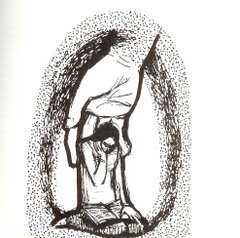
 This weekend several of us in the leaders' training class on spiritual formation (the pastor who is taking a group of his church leaders through this was kind enough to include a few of us from other churches) will be doing our assignments! My group meets on Thursdays every other week. We were only given the assignments for next week on Friday, two days ago. The topic this time is "What are God's principal means of transforming us?" It is not so much the topic that is daunting. It is more the way the questions are framed. This senior pastor believes that leaders should take the trouble to think critically and creatively. He has reminded us time and again that spiritual formation is not for those who are too busy or too lazy. In fact, to emphasize his point, some of the questions are compulsory assignments which have to be e-mailed to him before each class! And those who are unable to meet this requirement should consider opting out. This sounds quite severe and serious. And yet, knowing human nature and how lightly we would otherwise take things (take any average Bible study group and you find that less than 10% of the participants actually prepare!) this method does seem to inculcate a sense of intentionality and responsibility.
This weekend several of us in the leaders' training class on spiritual formation (the pastor who is taking a group of his church leaders through this was kind enough to include a few of us from other churches) will be doing our assignments! My group meets on Thursdays every other week. We were only given the assignments for next week on Friday, two days ago. The topic this time is "What are God's principal means of transforming us?" It is not so much the topic that is daunting. It is more the way the questions are framed. This senior pastor believes that leaders should take the trouble to think critically and creatively. He has reminded us time and again that spiritual formation is not for those who are too busy or too lazy. In fact, to emphasize his point, some of the questions are compulsory assignments which have to be e-mailed to him before each class! And those who are unable to meet this requirement should consider opting out. This sounds quite severe and serious. And yet, knowing human nature and how lightly we would otherwise take things (take any average Bible study group and you find that less than 10% of the participants actually prepare!) this method does seem to inculcate a sense of intentionality and responsibility.
I started yesterday. Went through the reading material and then began with the questions. After quite a number of hours, I was only halfway through. Decided to call it a day and tackle the remainder today, the Sabbath (guess it's justifiable to do spiritual formation homework on the 'day of rest'!). It is a sacrifice of time and effort. Thinking critically is hard work. It is to move us from 'information' to 'heart knowledge' and finally to experiential knowledge. This does not mean that those who do not have the mental capacity to do so will never experience spiritual formation. The Holy Spirit oversees the whole process, both for one who has greater mental capacity as well as for one who may not have. But for those who have the opportunity and capacity, I suppose there is the responsibility to do so.
What struck me most was the thought that the Holy Spirit works in tandem with the Word of God. He illuminates the written Word and grants us spiritual understanding. This was an important reminder. It is all too easy to be caught up with the textbooks and research material and forget that doing theology is first and foremost a prayerful effort. I believe I read somewhere that a true theologian is a prayerful person. I must admit that I pray little when I am actually engaged in work that requires much thinking and research. I lose the sense that the Spirit is with me and within me as I exercise my brain cells. Perhaps I should pause from time to time, in the midst of the heavy mental work (sometimes it does seem a torture!) and refocus on his presence and illumination. Yes, the Spirit's ministry of illumination requires that I study hard but also pray much and obey whatever truth has been shown.








+223.jpg)


























No comments:
Post a Comment